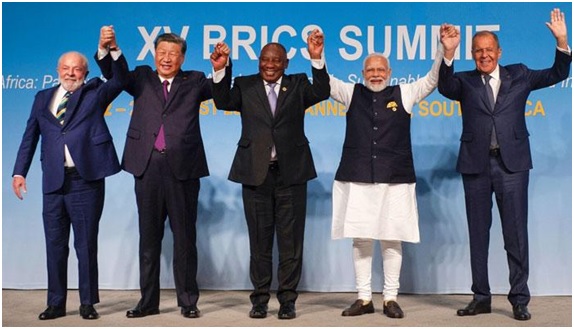BRICS Summit 2023 (The Hindu)

- 25 Aug 2023
Why in the News?
The 15th BRICS summit convened at the Sandton Convention Centre in South Africa from August 22nd to 24th. One of the significant outcomes of this summit was the unanimous agreement among BRICS leaders to broaden the group's membership by welcoming six new countries.
What are the Key Highlights of the Summit?
At the 15th BRICS Summit hosted in South Africa, the alliance extended invitations to six nations, marking a significant development that reinforces BRICS' position as a prominent 'voice of the Global South.' These new members, namely Iran, the United Arab Emirates, Saudi Arabia, Argentina, Egypt, and Ethiopia, are set to formally commence their participation in BRICS starting January 2024.
- Host: South Africa played host to this year's summit, taking on the role of Chair for BRICS since January 1, 2023.
- Theme: The overarching theme for the summit was "BRICS and Africa: Partnership for Mutually Accelerated Growth, Sustainable Development, and Inclusive Multilateralism."
- Five Priorities for 2023:
- The member nations focused on five key priorities:
- Advancing a partnership for a fair Just Transition.
- Revolutionizing education and skills development for the future.
- Exploiting opportunities through the African Continental Free Trade Area.
- Bolstering socio-economic recovery after the pandemic and working towards achieving the 2030 Agenda on Sustainable Development.
- Reinforcing multilateralism, which includes pursuing substantial reforms of global governance institutions and empowering women's meaningful participation in peace processes.
- Outcome Document: After the summit, member countries collectively adopted the Johannesburg II Declaration, which outlined their commitment to working on the following themes:
- Building a Partnership for Inclusive Multilateralism.
- Cultivating an Environment of Peace and Development.
- Fostering a Partnership for Mutually Accelerated Growth.
- Nurturing a Partnership for Sustainable Development.
- Deepening People-to-People Exchanges.
- Enhancing Institutional Development.
Significance of this Development:
- Amplified Advocate for Developing Nations: The inclusion of new member states bolsters BRICS' role as a prominent spokesperson for the interests of the developing world.
- Enhanced Global Influence: Currently representing approximately 40% of the global population and over a quarter of the world's GDP, BRICS' significance amplifies with these additions.
- The organization will now encompass nearly half of the world's population and incorporate three of the globe's major oil-producing nations, namely Saudi Arabia, the UAE, and Iran.
- China's Expanding Influence: This expansion also raises questions about China's growing dominance within BRICS, given its pivotal role in driving the group's enlargement.
- Noteworthy Regional Dynamics: The fact that regional rivals, Saudi Arabia and Iran, are both joining BRICS is particularly remarkable.
- China's role as the largest purchaser of Saudi Arabia's oil and its recent mediation in brokering a peace agreement between Tehran and Riyadh adds a distinctive dimension to this development.
The Recent Additions to BRICS:
The inclusion of new members in BRICS marks a noteworthy development in the alliance's composition:
- Iran: The invitation extended to Iran, a nation with strained ties with the West, is perceived as a move with strong backing from China and Russia.
- This signals Iran's strategic alignment with these major players on the global stage.
- Saudi Arabia: Historically, Saudi Arabia has been a staunch ally of the United States.
- However, recent trends suggest the kingdom's growing independence in its foreign policy decisions, and its decision to join BRICS aligns with this shift.
- Russia and Iran: For both Russia and Iran, BRICS membership serves as a diplomatic signal to the Western world, affirming that they maintain global friendships and strategic partnerships beyond Western alliances.
- Egypt and Ethiopia: Despite their longstanding ties with the United States, both Egypt and Ethiopia's involvement in BRICS indicates a diversification of their international partnerships and interests.
- Argentina: Amidst an economic crisis, Argentina's BRICS membership carries the expectation of potential financial assistance from the alliance, reflecting the nation's pursuit of economic stability and cooperation on the global stage.
Rationale for BRICS Expansion:
- Counterbalance to Anti-US Sentiment and Advocacy for Multipolarity: In light of significant anti-US sentiment prevailing worldwide, these countries seek a platform where they can harness this sentiment to unite effectively.
- Moreover, there's a growing demand for multipolarity, a forum through which Global South nations can demonstrate their solidarity.
- Emerging as a Counterweight to Western Hegemony: The conflict in Ukraine has resulted in Western nations coming together while simultaneously reinforcing the China-Russia partnership.
- Consequently, BRICS has evolved into an aspirational bloc capable of challenging the Western geopolitical perspective and serving as a counterweight to Western-dominated forums like the Group of 7 and the World Bank.
What BRICS Expansion Signifies for India's Global Positioning?
- India's recent participation in the G7 summit in Hiroshima and the informal Quad summit, alongside its continued engagement with the BRICS alliance, has sparked discussions about its foreign policy orientation.
- While some perceive these moves as indicative of India aligning more closely with the United States, it's crucial to underscore India's persistent commitment to the BRICS, often viewed as an 'anti-Western' bloc.
- Additionally, India maintains its presence within the Shanghai Cooperation Organisation (SCO) and maintains diplomatic relations with both Russia and China, despite occasional challenges.
- It is important to note that India's perspective on BRICS differs from China's. India sees BRICS as a forum that should remain non-aligned with Western powers, emphasizing its non-Western character.
- Regarding the recent expansion of BRICS to include new members, India views these additions as opportunities for valuable partnerships.
- However, concerns have arisen about the possibility of BRICS becoming more aligned with China's interests, potentially marginalizing India's influence within the group.
- This raises questions about how India will safeguard its voice and interests within BRICS as the alliance evolves.
